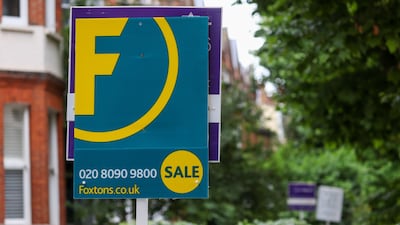The strongest growth in London in six years propelled UK average house prices to an average high of £294,260 ($338,089) in August, data from UK bank Halifax shows.
The figure marks a 0.4 per cent rise from July after a 0.1 per cent dip the month before, the first fall in a year.
The increase defied predictions that the cost of living crisis and soaring inflation would puncture the strength of the property market, which kept growing through the pandemic and last recession.
“While house prices have so far proved to be resilient in the face of growing economic uncertainty, industry surveys point towards cooling expectations across the majority of UK regions, as buyer demand eases, and other forward-looking indicators also imply a likely slowdown in market activity,” Kim Kinnaird, director of Halifax Mortgages, said on Wednesday.
Ms Kinnaird expects a “more challenging period” for house prices in the coming months because gains have stretched affordability for many purchasers. This was analysis shared by Bestinvest personal finance analyst Alice Haine, who described the market as being "on the turn".
“With the average two-year fixed deal hitting 4.2 per cent last week, it’s no wonder that some buyers are pausing plans to buy until the economy stabilises, while others accelerate their purchases in a bid to beat the interest-rate rises," she said.
Ms Haine sees uncertainty as a crucial factor in a likely market slowdown.
"While the message to potential sellers in the current climate from some quarters is to get their house listed now before the market drops, the outlook from here is increasingly uncertain," she said.
"A new prime minister means a new fiscal strategy and the country is now in a state of flux as it waits to hear what measures Liz Truss will put in place to support households through the cost of living crisis this winter.
"If the PM does indeed go ahead with the reported freeze on domestic gas and electricity prices, then inflation may peak at a more modest figure this year — rather than the dizzying highs of more than 22 per cent in January that some analysts were expecting.
“Such a move ... could also ease the pressure on the Bank of England to hike interest rates even further, allowing it to focus instead on boosting the economy to ward off recession rather than constraining it.
Mortgage rates at six-year high
Mortgage rates are now at their highest since 2016 after six interest-rate increases from the Bank of England since December, with another half-point rise expected next week.
The annual rate of house price growth was 11.5 per cent, little changed from the previous month’s 11.8 per cent. London and Wales were the strongest regions for sales, with prices in the capital jumping 8.8 per cent from a year ago, the most in six years. Wales had the fastest growth since 2005, up by 16.1 per cent.
The figures confirm a reading from the UK’s other main mortgage lender, which also registered growth in the market in August, typically a month where prices soften.
Nationwide Building Society said the average cost of a home rose by 0.8 per cent in August to £273,751, the 13th consecutive monthly increase.
“The Bank of England is widely expected to continue raising interest rates, which will also exert a cooling impact on the market if this feeds through to mortgage rates, which have already increased noticeably in recent months,” said Nationwide chief economist Robert Gardner.

